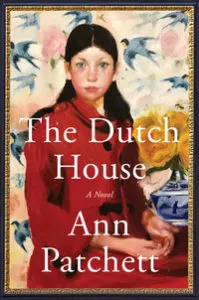THE DUTCH HOUSE Book Club Questions: Your Meeting Guide
This content contains affiliate links. When you buy through these links, we may earn an affiliate commission.
Have you chosen Ann Patchett’s 2019 novel The Dutch House for your book club? Here are ten The Dutch House book club questions and a reading guide to get the conversation going.
Ann Patchett’s The Dutch House is the book everyone is talking about right now. And I know this because when I visited my family for the holidays, more than one family member came up to me and asked if I’d read it yet. Word evidently spread over the end of the year, because when I went back to work, everyone was talking about this book there as well.
 So what did I do? I decided to give into the hype and purchase the audiobook version of this novel. Several people told me this was a great audiobook (have I mentioned everyone is talking about this book?). Even better, America’s dad Tom Hanks narrates it. I sat back to listen to the novel and ended up finishing it over the course of two days. Now, I have thoughts. I have questions. And I’m here to share them with you in the hopes your book club will find them helpful!
So what did I do? I decided to give into the hype and purchase the audiobook version of this novel. Several people told me this was a great audiobook (have I mentioned everyone is talking about this book?). Even better, America’s dad Tom Hanks narrates it. I sat back to listen to the novel and ended up finishing it over the course of two days. Now, I have thoughts. I have questions. And I’m here to share them with you in the hopes your book club will find them helpful!
 So what did I do? I decided to give into the hype and purchase the audiobook version of this novel. Several people told me this was a great audiobook (have I mentioned everyone is talking about this book?). Even better, America’s dad Tom Hanks narrates it. I sat back to listen to the novel and ended up finishing it over the course of two days. Now, I have thoughts. I have questions. And I’m here to share them with you in the hopes your book club will find them helpful!
So what did I do? I decided to give into the hype and purchase the audiobook version of this novel. Several people told me this was a great audiobook (have I mentioned everyone is talking about this book?). Even better, America’s dad Tom Hanks narrates it. I sat back to listen to the novel and ended up finishing it over the course of two days. Now, I have thoughts. I have questions. And I’m here to share them with you in the hopes your book club will find them helpful!
The Dutch House: A Reading Guide
HarperCollins published Ann Patchett’s eighth novel, The Dutch House, on September 24, 2019. The novel tells the story of Danny and Maeve Conroy over the course of five decades. The siblings are raised together in the Dutch House by their father and their stepmother Andrea. But when Danny and Maeve’s father dies, Andrea forces the two out of the house. Left with no one else to care for them, Danny and Maeve spend the rest of their lives looking after one another in various ways. Danny Conroy narrates the novel as an adult looking back on his life, his sister, and The Dutch House. Setting is very important in this novel, which takes place in Elkins Park, Philadelphia. In an interview with The Philadelphia Inquirer, Patchett explains that she set the novel here because she wanted a place that was close in proximity to New York, and she spent some time in Elkins Park when she was a student at Sarah Lawrence College. In the same interview, Patchett discusses the themes that she writes about in all of her novels, including The Dutch House: “I write a lot about wealth and poverty. I write a lot about class. And I write a lot about race, although not in this book. I think that for every writer, there are just certain things that obsess you, and you keep coming back.” How did these themes play out in the novel? And what other things obsessed you as you read the story of Maeve, Danny, and the house from which they were banished? Let’s talk through it. Obviously, some spoilers to follow.10 The Dutch House Book Club Questions
- Why was the story narrated from Danny’s perspective rather than Maeve’s? How might the story have been different if told from Maeve’s point of view?
- There are many descriptions of the Dutch House throughout the novel. In her interview with The Philadelphia Inquirer, Ann Patchett says that while many people have told her the descriptions of the house are very vivid, she truly believes she left a lot of the house up to the individual reader’s imagination. What was your image of the Dutch House? Does it differ from other members of your book club?













